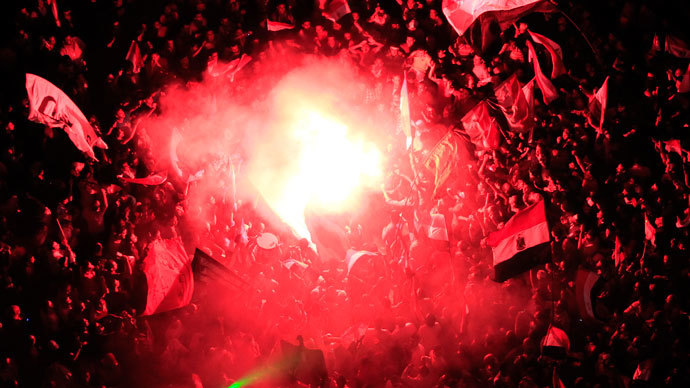As Egypt 'spirals out of control,' who will step in?

Egypt's military brass have the power to determine the country's future, although that could mean continued economic instability and more failed democratic policies, Mark Almond, a historian and Middle East expert, told RT.
RT:Let’s get more analysis now on the statement made in Egypt for joined line by Mark Almond he's a historian and Middle East expert. Thanks for taking time to speak with us. I want to begin with this announcement made by the army in Egypt essentially coming out in support of the protesters. How do you read into this? Does it raise perhaps fears of military intervention in a country that has had more than its fair share of that?
Mark Almond: Yes, it seems very much that army is essentially trying to determine the future. And that could be a return to the past because what is very striking is there isn’t an obvious alternative to Morsi there is not a clear figure head for the opposition. So, even if Morsi was to resign there is nobody automatic to take his place. Not least because the constitutional court has invalidated the elections to the parliament. So, that we have in Egypt is a very, very difficult situation because the only one person with any kind of democratic legitimacy is the president and his own legitimacy is now under attack from huge crowds in the streets and from the army and the police who have refused to defend himself from his party.
RT:At the same time he is just playing double advocates, according to a statement read out by the army and state television. They said that they have responsibility to act because Egypt’s national security is facing “grave danger,” I mean, does a country’s military, in fact, have responsibility to ensure security?
MA: Of course, Egypt is in a very difficult situation, there is an internal security problem both -there was violence in the streets last night in Egypt, there has been violence in Sinai for instance repeatedly, we have seen the terrible riots at football years ago. But also there is the basic problem that the economy is spiraling downward and the government has no real viable economic policies, it’s really living from hand to mouth, from day to day. So, Morsi’s government’s failed to fulfill its election promises that it would turn the economy around and it’s also failed really to establish a clear line of authority in the state and in that sense now the army is one of a few institutions to Egypt that still functions and perhaps still has respect.

RT:Morsi has been in power for a year, perhaps a mistake to say that he could fix all of these issues within a hundred days, but when you look at the demands of protesters for Mr. Morsi to step down given the divisions in the country and the fact that Mr. Morsi is the only one with 51% of the vote if there is a new election, Is there any guarantee that there won’t be feather chaos again?
MA: I think, this is the big problem, isn’t it? That we have a situation when the constitutional court invalidated the elections to the parliamentary chambers, the president’s election was certainly disputed by his opponents, it was the way narrow result. A lot of people who voted for him then seem no longer to be happy with him now. That can happen in any democracy but of course Egypt is not just any democracy. It is a country that is suffering a very severe economic crisis, it is trying to create institutions of a viable state in a democratic system. But instead it seems that the changes since the fall of Mubarak are really spiraling to a situation out of control. That tends, then, to suggest that somebody with power, real military power, may step in. But, of course, the generals may be popular with the crowd in the street today if they were to topple Morsi but whoever comes to power, or if Morsi stays in power, it’s difficult to see that basic problems of great poverty, dwindling resources coming into the country, terrible problems of paying for the important vital resources including food, those can’t easily be resolved whoever is in power.
RT:Excellent point. And I’m just curious. I mean, given the intense protests on the street, given the military’s comment what actions could you foresee Mr. Morsi taking perhaps in order not to lose his grip on power? Very briefly.
MA: I think he is in very difficult position. If the generals really push he will fall. What may be his best hope is to say “Would you like to replace him? Would you like to be the person who took responsibility and carry the can and face in 6 weeks or 6 month down a line people in huge numbers saying that you got out of Morsi, but what have you done solving the problems? ” So he may be saved by the fact that it’s a very unenviable position to be in charge of Egypt.
The statements, views and opinions expressed in this column are solely those of the author and do not necessarily represent those of RT.
The statements, views and opinions expressed in this column are solely those of the author and do not necessarily represent those of RT.












